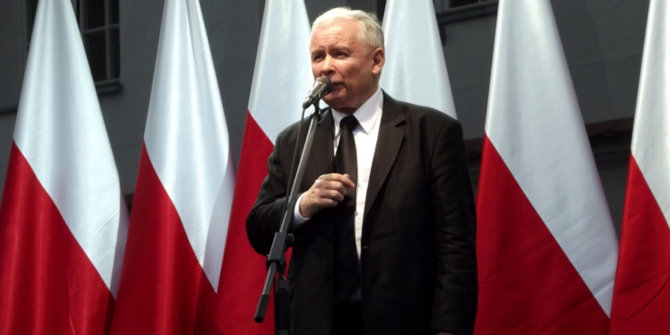The six months since the United Kingdom voted to leave the European Union have been the most tumultuous in British politics since WW2, according to a new report: Brexit: Six months on. The team from UK in a Changing Europe provide an overview of the report’s findings and where its contributors predict the UK will go next in 2017.
Within a day of the vote, the prime minister had resigned and Scottish independence was back on the agenda; within a week, the leader of the Opposition faced a leadership challenge and the leader of UKIP stepped down; within a month, the UK had a new Prime Minister. Dr Simon Usherwood concludes: “While none of these alone is unprecedented, there has been no moment in the post-War period when so much has happened almost at once.”
The report, by the senior fellows and director of The UK in a Changing Europe, and in collaboration with the Political Studies Association, looks at the key political, economic, legal, social and security changes that have occurred since 23 June as well as at how other EU countries view Brexit.
Professor Matthew Goodwin highlights how Brexit has exposed a deep and widening divide in the Labour Party. It faces tensions between its working-class, struggling, northern, eurosceptic and anti-immigration seats (70% of Labour seats voted Brexit) and its more middle class, financially secure, southern, pro-EU and cosmopolitan constituencies.
Findings from the report reveal a combination of massive shock and inertia in the British Government. There has been a major reorganisation of Whitehall, which has seen the creation of new ministries and the marginalisation of the Treasury and Foreign Office. Yet, Dr Usherwood notes: “The government seems to have articulated little more than a series of unrelated and mutually conflicting aspirations, which highlights the absence of a game-plan.”
The report highlights how Brexit has united the EU27 to a degree rarely seen before. EU member states believe the British Government is working opportunistically with only UK interests in mind and little consideration for wider European issues and priorities. Support for the UK has declined significantly, as even Denmark, the UK’s ‘little brother’, which usually follows in its footsteps, has made clear that any concessions that do not benefit Copenhagen will be rejected. Sara Hagemann concludes: “The UK Government can take the tone and position of this small and likeminded ally as a signal of what is ahead when actual negotiations begin during 2017.”
Dr Angus Armstrong deciphers the government’s preferred trading relationship with the EU and finds the evidence suggests that:
- The UK will no longer be a member of the single market and (probably) not the customs union.
- Goods will be covered by a Free Trade Agreement or a low tariff schedule. The UK requires as broad an agreement on services as possible
- The UK will also seek to continue to participate in a number of EU programmes, for which EU membership is not required, like Horizon 2020 or Erasmus
- The prime minister seems to have ruled out the ECJ, but not the EFTA Court
- The UK would sweeten this deal with continuing payments to the EU budget and preferential access for EU workers to the UK labour market.
On immigration, Jonathan Portes argues that the evidence suggests:
- It will be fully under UK Government control
- Policies will be relatively restrictive, resulting in a large fall in EU migration as well as continued downward pressure on non-EU migration
The UK will probably retain some degree of preference for EU nationals compared to non-EU nationals
- There may be some sector-specific schemes.
Anand Menon, director of The UK in a Changing Europe, said: “This report takes stock of the decision on 23 June for the UK to leave the EU. What is striking is that, six months on, we are little closer to knowing what Brexit actually means.
“Having said that Brexit has precipitated fundamental shifts in British politics. It has also brought up significant questions, which still remain unanswered, about Britain’s future laws and its foreign and immigration policies as well as the nations’ relationship within the United Kingdom.”
Click here to read the full report.
Please read our comments policy before commenting.
Note: This article was originally published at UK in a Changing Europe. It gives the views of the authors, and not the position of EUROPP – European Politics and Policy, nor of the London School of Economics.





monetary contributions to the EU budget are no chump change, but at net €6-8 billions per annum it’s also peanuts in the grand scheme of things
for comparisons, Italy is currently cobbling together a €25 billions bank bail-out pretty much by itself.
and the EU (minus the UK) is still a €13000+ billions regional economy (of which the EU budget is no more than 1% of GDP)
in addition, the contributions are mostly used for the well functioning of the single market’s administration, the only true european policy (CAP), and development of poor regions. these are not “bribes” and any suggestions otherwise are not only deeply untrue but insulting
all in all, I wonder if the UK political body truly realize just how much benefits they truly derive from participation as a full member of the EU. it is litterally worth tens of times any “peanuts” monetary contribution they lordly seem to be ready to grant those pesky europeans … and this is something that the other side (EU) is fully aware of.
“EU member states believe the British Government is working opportunistically with only UK interests in mind and little consideration for wider European issues and priorities.”
and they will not let it slide.
no rancour, just treating the UK as any other rival trading country.
Oh dear…. more of the tedious “we are little closer to knowing what Brexit actually means.”
from “UK in a Changing Europe”
We are constantly told that Remainers include more graduates with not so subtle hints that Remainers are cleverer than Leavers, typically by adding “Leavers didn’t know what they were voting for”
So how is that these “clever” Remainers still “don’t know what Brexit means” ?
Let’s try and put it in simple terms…..
Suppose that a future LibDem Government allowed unlimited migration.
That would be “OK” – just so long as it was not conditional on anything else from the EU.
i.e. not a trade-off for trade.
Also, it would be “OK” if that LibDem government adopted every existing EU law.
What would NOT be OK would be:
– being subject to the ECJ
– agreeing to adopt all future EU laws
Does Brexit need explaining further?
This is the classic “stop letting Europe tell us what to do” angle – the tendency to assign huge importance to minor issues of sovereignty while ignoring the practical effects of what you’re proposing. You seem to think, for instance, that it would be better for the entire country to be poorer and people to lose their jobs than formally have an arrangement where the ECJ can oversee agreements we’ve signed up to (something that doesn’t make a blind bit of difference to 99.9% of people living in the UK). You’ll cry and rant and claim that isn’t what you’re saying, but it’s a direct consequence of what you’ve written – sovereignty (or should that be the illusion of sovereignty) is more important than the economy and people’s livelihoods. Better to lose your job than have a judge in Luxembourg tell another judge in London how to interpret a regulation about the size classifications of bananas.
And really, this isn’t a complicated topic. The EU, the EEA and whatever other arrangement we might dream up for the UK is about two sides making a commitment. In the case of the single market, it’s about the existing members giving us full and unfettered access in exchange for us applying the rules of the single market while we’re in it (i.e. implementing the laws that govern it). The whole point in the ECJ is that it gives some guarantee (for us as well as the rest of Europe) that everyone will keep to the rules they’ve agreed to. Most people with an ounce of perspective accept that for what it is. If you want to sabotage our own economy because you can’t accept that system then you’re entitled to rant and rave about it for eternity, but it’s the government’s responsibility to safeguard the interests of the public and I expect they’ll see common sense in the end.